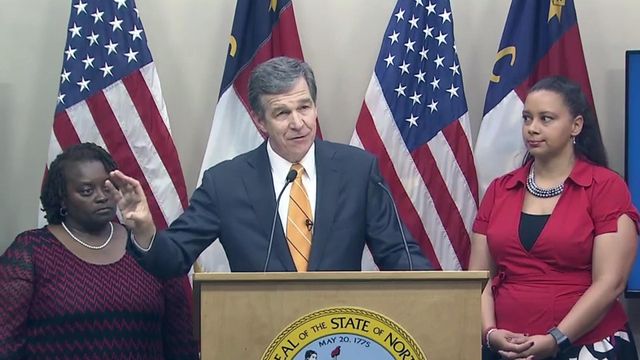Cooper vetoes GOP budget, saying it 'doesn't cut it'
Saying the $23.9 billion state budget crafted behind closed doors by Republican lawmakers "doesn't cut it," Gov. Roy Cooper vetoed the spending plan on Wednesday.
Posted — UpdatedDuring a news conference in which he was surrounded by teachers and school support staff, most of whom were dressed in red, Cooper said the budget provided inadequate funding for public schools while providing unnecessary tax breaks to businesses and wealthy individuals.
Thousands of teachers descended on the legislature three weeks ago as the General Assembly opened its 2018 session, seeking more support for schools. North Carolina ranks 37th nationally in teacher pay and 39th in per-pupil spending.
"Republican legislators not only ignored the message that those teachers brought, they had the audacity to claim that the legislature had done enough for public education," Cooper said. "They boasted about a budget that failed our schools, our teachers and, most importantly, our students."
Cooper had proposed a budget that provided an average 8 percent raise for teachers, while lawmakers' budget included average raises of 6.5 percent. The governor said his spending plan included four times the money lawmakers allocated for school safety upgrades, as well as more money for textbooks, digital learning tools, classroom supplies and early childhood education programs.
"We have to invest more in public education," he said.
To pay for much of his education program, the governor proposed freezing income tax cuts scheduled to take effect next year for companies and wealthy individuals.
Legislative leaders rolled out their budget late on Memorial Day and approved it less than four days later, using a parliamentary procedure to block any proposed amendment to the plan.
Cooper called the move an "unprecedented, authoritarian power grab" and said he doesn't think North Carolinians will stand for a "secret, unchangeable budget."
Republicans hold veto-proof majorities in both the House and the Senate and can easily override Cooper's veto – only one Republican House member voted against it last week, and that was because of how the budget was handled, not what was in it.
House Speaker Tim Moore and Senate President Pro Tem Phil Berger promised a quick override, saying Cooper's veto is merely for "scoring political points" with teachers.
"Let’s be clear about what the governor has done. He has opposed a 6.5 percent teacher pay raise, he has opposed an 8 percent state trooper raise, he has opposed a new living wage of $31,200 for state employees, and he has opposed tax cuts that would result in 99 percent of families and small businesses having reduced or no state income tax," Moore and Berger said in a joint statement. "The people of North Carolina deserve better, and they will get it when we override his veto."
Still, Cooper said it was important for him to take a stand with his veto.
"It's important to do the right thing," he said. "November is coming. People have a choice between the budget I am proposing that invests in public education and clean water and health care and a budget that concentrates on tax breaks for corporations and families making over $200,000 a year. ... That is a stark choice."
The governor said he tried to communicate clear priorities with his budget, but given that Berger, Moore and a few of their top lieutenants put together their budget with little outside input, there was little conversation over reaching common ground on spending.
"Who could get in the room?" he said. "Maybe they'll have a moment that they decide we do need to talk about what's best for public education. I welcome that conversation."
In addition to education spending, Cooper criticized provisions to address GenX contamination in state waterways as catering to the manufacturer, the "pittance" allocated to address opioid addiction, language that jeopardizes a planned light rail line between Durham and Chapel Hill and the continued refusal to expand Medicaid to thousands of low-income people.
He dismissed projections from the legislature's nonpartisan Fiscal Research Division that his budget would lead to a $450 million deficit in a couple of years, insisting he offered a balanced budget and that Republican tax cuts would lead to state deficits.
Related Topics
• Credits
Copyright 2024 by Capitol Broadcasting Company. All rights reserved. This material may not be published, broadcast, rewritten or redistributed.






